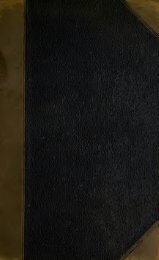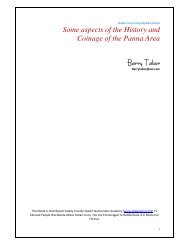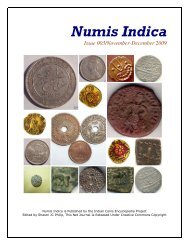- Page 7:
THE NUMISMATIC CHRONICLE, JOURNAL O
- Page 10 and 11:
, CV: V.I 'Q.& . LONDON : PRINTED B
- Page 12 and 13:
vi CONTENTS. Page Bilingual Coins o
- Page 15 and 16:
PROCEEDINGS OF THE NUMISMATIC SOCIE
- Page 17 and 18:
NUMISMATIC SOCIETY. 6 28. Les monna
- Page 19 and 20:
NUMISMATIC SOCIETY. crown ; a silve
- Page 21 and 22:
NUMISMATIC SOCIETY. 7 2. Revue Beig
- Page 23 and 24:
NUMISMATIC SOCIETY. bearded head, a
- Page 25 and 26:
NUMISMATIC SOCIETY. 11 2. Revue Bei
- Page 27 and 28:
NUMISMATIC SOCIETY. 13 JUNE 16, 188
- Page 29 and 30:
NUMISMATIC SOCIETY. 15 Society. Par
- Page 31 and 32:
NUMISMATIC SOCIETY. 17 coins in the
- Page 33 and 34:
developed at a single step coins. N
- Page 35 and 36:
NUMISMATIC SOCIETY. 21 A remarkable
- Page 37 and 38:
NUMISMATIC SOCIETY. From this brief
- Page 39 and 40:
NUMISMATIC SOCIETY. 25 his essays o
- Page 41:
PROCEEDINGS OF THE NUMISMATIC SOCIE
- Page 45 and 46:
LIST OF MEMBERS OF TUB NUMISMATIC S
- Page 47 and 48:
LIST OF MEMBERS. 5 FORD, T. K., ESQ
- Page 49 and 50:
" LIST OF MEMBERS. 7 MORRIESON, LIE
- Page 51 and 52:
LIST OF MEMBERS. 9 *WADDINQTON, MON
- Page 53:
f^^j* Num. Chrori. Ser.W. Vol. I. P
- Page 56 and 57:
2 NUMISMATIC CHRONICLE. does not re
- Page 58 and 59:
N I'MISM ATfC CHRONICLE. connected
- Page 60 and 61:
6 NUMISMATIC CHRONICLE. To return t
- Page 62 and 63:
II- COINS FROM CENTRAL ASIA. I. A S
- Page 65 and 66:
COINS FROM CENTRAL ASIA. 9 The type
- Page 67 and 68:
COINS FROM CKNTRAI, ASIA. 11 consid
- Page 69:
7 3. PENNIES OF STEPHEN.
- Page 72 and 73:
14 NUMISMATIC CHRONICLE. mittee of
- Page 74 and 75:
16 NUMISMATIC CHRONICLE. Obv. E . B
- Page 76 and 77:
18 NUMISMATIC CHRONICLE. M. 2. AAK]
- Page 78 and 79:
20 NUMISMATIC CHRONICLE. Also on a
- Page 80 and 81:
22 NUMISMATIC CHRONICLE. This varie
- Page 82 and 83:
IV. NOTE ON SOME DISCOVERIES OF ROM
- Page 85 and 86:
RECENT DISCOVERIES OF ROMAN COINS.
- Page 87 and 88:
RECENT DISCOVERIES OF ROMAN COINS.
- Page 89 and 90:
RECENT DISCOVERIES OF ROMAN COINS.
- Page 91 and 92:
RECENT DISCOVERIES OF ROMAN COINS.
- Page 93:
COINS OF THE BAHMANI DYNASTY. . Chr
- Page 96 and 97:
34 NUMISMATIC CHRONICLE. Chron., vo
- Page 98 and 99:
36 NUMISMATIC CHRONICLE. the follow
- Page 101 and 102:
VI. COINS OF STEPHEN AND OTHERS FOU
- Page 103 and 104:
COINS OF STEPHEN AND OTHERS FOUND A
- Page 105 and 106:
COINS OF STEPHEN AND OTHERS FOUND A
- Page 107: DEVONSHIRE TOKENS OF THE I7 TH CENT
- Page 110 and 111: 44 NUMISMATIC CHRONICLE. and sixpen
- Page 112 and 113: 46 NUMISMATIC CHRONICLE. Let us rec
- Page 114 and 115: VIII. HAVE WE NO IRISH COINS OP EDW
- Page 116 and 117: 50 NUMISMATIC CHRONICLE. mint. More
- Page 118 and 119: 52 NUMISMATIC CHRONICLE. ment of th
- Page 120 and 121: 54 NUMISMATIC CHRONICLE. labour wer
- Page 122 and 123: 56 NUMISMATIC CHRONICLE. work. One
- Page 124 and 125: 58 NUMISMATIC CHRONICLE. of coining
- Page 126 and 127: 60 XfMlSMATIC CHRONICLE. England, o
- Page 128 and 129: 62 NUMISMATIC CHRONICLE. much in va
- Page 130 and 131: 64 NUMISMATIC CHRONICLE. Observe al
- Page 132 and 133: 66 NUMISMATIC CHKONICLK. tinction,
- Page 134 and 135: 68 NUMISMATIC CHRONICLE. Among the
- Page 136 and 137: 70 NTMISMATIC CHRONICLE. . . Hyspao
- Page 138 and 139: 72 NUMISMATIC CHRONICLE. form a nuc
- Page 140 and 141: 74 NUMISMATIC CHRONICLE. municate t
- Page 142 and 143: 76 NUMISMATIC CHRONICLE. types and
- Page 144 and 145: 78 NUMISMATIC CHRONICLE. as forming
- Page 146 and 147: 80 NUMISMATIC CHRONICLE. well as nu
- Page 148 and 149: 82 NUMISMATIC CHRONICLE. hemidrachm
- Page 150 and 151: 84 NUMISMATIC CHRONICLE. 13 cases.
- Page 152 and 153: 86 NUMISMATIC CHRONICLE. later clas
- Page 154 and 155: 88 NUMISMATIC CHRONICLE. In the fiv
- Page 156 and 157: 90 NUMISMATIC CHRONICLE. A vase of
- Page 160 and 161: 94 NUMISMATIC CHRONICLE.. crown, Zu
- Page 162 and 163: 96 NUMISMATIC CHRONICLE. man leavin
- Page 164 and 165: 08 NUMISMATIC CHRONICLE. who agreed
- Page 166 and 167: 100 NUMISMATIC CHRONICLE. unwilling
- Page 168 and 169: 102 NUMISMATIC CHRONICLE. remained
- Page 170 and 171: 104 NUMISMATIC CHRONICLE. VIII. Fir
- Page 172 and 173: 106 NUMISMATIC CHRONICLE. Ahsanabad
- Page 174 and 175: 108 NUMISMATIC CHRONICLE. his reign
- Page 176 and 177: 110 NUMISMATIC CHRONICLE. place my
- Page 178 and 179: 112 NUMISMATIC CHRONICLE. 4. Anothe
- Page 180 and 181: 114 NUMISMATIC CHRONICLK. 11. Anoth
- Page 182 and 183: XI. BILINGUAL COINS OF BUKHA'RA'. A
- Page 184 and 185: 118 NUMISMATIC CHRONICLE. ing origi
- Page 186 and 187: 120 NUMISMATIC CHRONICLE. ventional
- Page 188 and 189: 122 NUMISMATIC CHRONICLE. Bukhara C
- Page 190 and 191: 124 NUMISMATIC CHRONICLE. legends w
- Page 192 and 193: 126 NUMISMATIC CHRONICLE. Albiruni
- Page 194 and 195: 128 NUMISMATIC CHRONICLE. de plus e
- Page 196 and 197: 130 NUMISMATIC CHRONICLE. devait no
- Page 198 and 199: 132 NUMISMATIC CHRONICLE. paiement
- Page 200 and 201: 134 NUMISMATIC CHRONICLE. ghach, 18
- Page 202 and 203: 136 NUMISMATIC CHRONICLE. de huit a
- Page 204 and 205: 138 NUMISMATIC CHRONICLE. poetes le
- Page 206 and 207: 140 NUMISMATIC CHRONICLE. Khalaf av
- Page 208 and 209:
142 NUMISMATIC CHRONICLE. (Time nom
- Page 210 and 211:
144 NUMISMATIC CHRONICLE. de*sir de
- Page 212 and 213:
146 NUMISMATIC CHRONICLE. tete et I
- Page 214 and 215:
148 NUMISMATIC CHRONICLE. vous etai
- Page 216 and 217:
150 NUMISMATIC CHRONICLE. et lea so
- Page 218 and 219:
152 NUMISMATIC CHRONICLE. du pays d
- Page 220 and 221:
154 NUMISMATIC CHRONICLE, d'armee p
- Page 222 and 223:
156 . NUMISMATIC CHRONICLE. pris en
- Page 224 and 225:
XIII. NOTES ON A FORBES PENNY OF AL
- Page 226 and 227:
160 NUMISMATIC CHRONTCT/E. anders,
- Page 228 and 229:
XIV. ADDENDA TO DEVONSHIRE SEVENTEE
- Page 230 and 231:
164 NUMISMATIC CHRONICLE. of the to
- Page 232 and 233:
166 NUMISMATIC CHRONICLE. BARNSTAPL
- Page 234 and 235:
168 NUMISMATIC CHRONICLE. transpose
- Page 236 and 237:
MISCELLANEA. NOTICES OF SALES OF CO
- Page 238 and 239:
172 NUMISMATIC CHRONICLE. pi. xi. n
- Page 240 and 241:
174 NUMISMATIC CHRONICLE. AND . PEA
- Page 242 and 243:
176 NUMISMATIC CHRONICLE. IVSTITIA
- Page 245 and 246:
XV. ON THE CHRONOLOGICAL SEQUENCE O
- Page 247 and 248:
CHRONOLOGICAL SEQUENCE OF THE COINS
- Page 249 and 250:
CHRONOLOGICAL SEQUENCE OF THE COINS
- Page 251 and 252:
CHRONOLOGICAL SEQUENCE OF THE COINS
- Page 253 and 254:
PERIOD I. CIRC. B.C. 600 550. The c
- Page 255 and 256:
B(EOTIA. PERIOD I. CIRC. B.C. 600 5
- Page 257 and 258:
PERIOD II. CIRC. B.C. 550 180. Duri
- Page 259 and 260:
Hemi-drachm. 47-2 grs. Obol. 15 grs
- Page 261 and 262:
Drachm. 95-5 grs. BCEOTIA. PERIOD I
- Page 263 and 264:
BCEOTIA. PERIOD II. CIRC. B.C. 550
- Page 265 and 266:
BCEOTIA. PERIOD III. CIRC. B.C. 480
- Page 267 and 268:
BCEOTIA. PERIOD III. CIRC. B.C. 480
- Page 269 and 270:
PERIOD IV. CIRC. B.C. 456 446. The
- Page 271 and 272:
BCEOTIA. PERIOD IV. CIRC. B.C. 456
- Page 273 and 274:
THEBES. Stater. 187-5 grs. Stater.
- Page 275 and 276:
B(EOTIA. PERIOD V. CIRC. B.C. 446 4
- Page 277 and 278:
BCEOTIA. PERIOD V. CIRC. B.C. 446 4
- Page 279 and 280:
BCEOTIA. PERIOD VI. CIRC. B.C. 426
- Page 281 and 282:
]?
- Page 283 and 284:
PERIOD VII. CIRC. B.C. 395387. The
- Page 285 and 286:
B(EOTTA. PERIOD VII. CIRC. B.C. 395
- Page 287 and 288:
PERIOD VIII. CIRC. B.C. 387374. The
- Page 289 and 290:
B(EOT1A. PERIOD VIII. CIRC. B.C. 38
- Page 291 and 292:
BCEOT1A. PERIOD VIII. CIRC. B.C. 38
- Page 293 and 294:
BOJOTIA. PERIOD V11I. CIRC. B.C. 38
- Page 295 and 296:
BrEOTIA. PERIOD VI11. CIRC. B.C. 38
- Page 297 and 298:
BCEoriA. PERIOD vin. CIRC. B.C. 387
- Page 299 and 300:
BCEOTIA. PERIOD VIII. CIRC. B.C. 38
- Page 301 and 302:
BCEOTIA. PERIOD VIII. CIRC. B.C. 38
- Page 303 and 304:
BCEOTIA. PERIOD VIII. CIRC. B.C. 38
- Page 305 and 306:
PERIOD IX. CIRC. B.C. 379338. THEBE
- Page 307 and 308:
IHEOTIA. PERIOD IX. CIRC. B.C. 379
- Page 309 and 310:
NAME. BCEOTIA. PERIOD IX. CIRC. B.C
- Page 311 and 312:
B(EOTIA. PERIOD IX. CIRC. B.C. 379
- Page 313 and 314:
BCEOTIA. PERIOD IX. CIRC. B.C. 379-
- Page 315 and 316:
BCEOTIA. PERIOD IX. CIRC. B.C. 879
- Page 317 and 318:
PERIOD X. CIRC. B.C. 338315. Whethe
- Page 319 and 320:
BCEOTTA. PERIOD X. CIRC. B.C. 338 3
- Page 321 and 322:
BCEOTIA. PERIOD X. CIRC. B.C. 338 3
- Page 323 and 324:
ORCHOMENUS. BCEOTIA. PERIOD X. CIRC
- Page 325 and 326:
BCEOTIA. PERIOD XI. CIRC. B.C. 315
- Page 327 and 328:
JR. Tetra- BCEOTIA. PERIOD XII. CIR
- Page 329 and 330:
BCEOTIA. PERIOD XIII. CIRC. B.C. 24
- Page 331 and 332:
BCEOTIA. PERIOD XIII. CIRC. B.C. 24
- Page 333 and 334:
BCEOT1A. PERIOD XIV. CIRC. B.C. 197
- Page 335 and 336:
BCEOTIA. PERIOD XIV. CIRC. B.C. 197
- Page 337 and 338:
PERIOD XV. CIRC. B.C. 14627. Not ma
- Page 339 and 340:
PERIOD XVI. IMPERIAL TIMES. There c
- Page 341 and 342:
BCEOTIA. PERIOD XVI. IMPERIAL TIMES
- Page 343 and 344:
BCEOT1A. PERIOD XVI. IMPERIAL TIMES
- Page 345 and 346:
NOTICES OF RECENT NUMISMATIC PUBLIC
- Page 347 and 348:
NOTICES OF RECENT NUMISMATIC PUBLIC
- Page 349:
|4 Num. IV. B.C. 456-446 V. B C. 44
- Page 353:
Num. VIII B C. 387-374 COINAGE OF B
- Page 357:
1 10 XII. B.C. 288-244 XIII B.C 24-
- Page 361:
SILVER COINS OF TIBET.
- Page 364 and 365:
282 NUMISMATIC CHRONICLE. There is,
- Page 366 and 367:
284 NUMISMATIC CHRONICLE. out golde
- Page 368 and 369:
286 NUMISMATIC CHRONICLE. the third
- Page 370 and 371:
288 KUMI8MAT1C CHRONICLE. didrachm.
- Page 372 and 373:
290 NUMISMATIC CHRONICLE. in his La
- Page 374 and 375:
292 NUMISMATIC CHRONICLE. ***** Phi
- Page 376 and 377:
294 NUMISMATIC CHRONICLE. The Athen
- Page 378 and 379:
296 NUMISMATIC CHRONICLE. and small
- Page 380 and 381:
298 NrMTSMATTC CHRONICLE. names of
- Page 382 and 383:
1500 NUMISMATIC CHRONICLE. have alr
- Page 384 and 385:
302 NUMISMATIC CHRONICLE. value, wh
- Page 386 and 387:
304 NUMISMATIC CHRONICLE. And more
- Page 388 and 389:
XYIL NOTE ON A FIND OF ROMAN COINS
- Page 390 and 391:
XVIII. ACCOUNT OF COINS OF HENRY II
- Page 392 and 393:
XIX. ON THE IRISH COINS OF RICHARD
- Page 394 and 395:
312 NUMISMATIC CHRONICLE. grete you
- Page 396 and 397:
314 NUMISMATIC CHRONICLE. with the
- Page 398 and 399:
316 NUMISMATIC CHRONICLE. and strik
- Page 400 and 401:
318 NUMISMATIC CHRONICLE. the same
- Page 402 and 403:
320 NUMISMATIC CHRONICLE. courts ag
- Page 404 and 405:
322 NUMISMATIC CHRONICLE. 2. Obv. S
- Page 406 and 407:
324 NUMISMATIC CHRONICLE. to mainta
- Page 408 and 409:
326 NUMISMATIC CHRONICLE* shield wi
- Page 410 and 411:
328 NUMISMATIC CHRONICLE. 8. Obv. K
- Page 412 and 413:
330 NUMISMATIC CHRONICLE. THIRD COI
- Page 414 and 415:
332 NUMISMATIC CHRONICLE. same insc
- Page 416 and 417:
XX. MEDALS BY G. M. POMEDELLO. THE
- Page 418 and 419:
336 NUMISMATIC CHRONICLE. Magno, a
- Page 420 and 421:
338 NUMISMATIC CHRONICLE. Fortune,
- Page 422 and 423:
XXI. THE SILVER COINAGE OF TIBET. N
- Page 424 and 425:
342 NUMISMATIC CHRONICLE. 1. No.pal
- Page 426 and 427:
344 NUMISMATIC CHRONICLE. The custo
- Page 428 and 429:
346 NUMISMATIC CHRONICLE. of the Vr
- Page 430 and 431:
343 NUMISMATIC CHRONIC], F. Sri, Sr
- Page 432 and 433:
350 NUMISMATIC CHRONICLE. coinage,
- Page 434 and 435:
352 NUMISMATIC CHRONICLE. VII. Obv.
- Page 436 and 437:
NOTICES OF RECENT NUMISMATIC PUBLIC
- Page 438 and 439:
356 NUMISMATIC CHRONICLE. 6. F. Ken
- Page 440 and 441:
358 INDEX. Floral patterns on Greek
- Page 447:
CJ 1 N6 ser.3 v.l The Numismatic ch

















